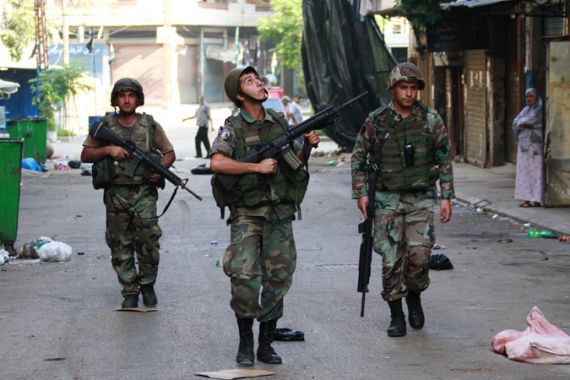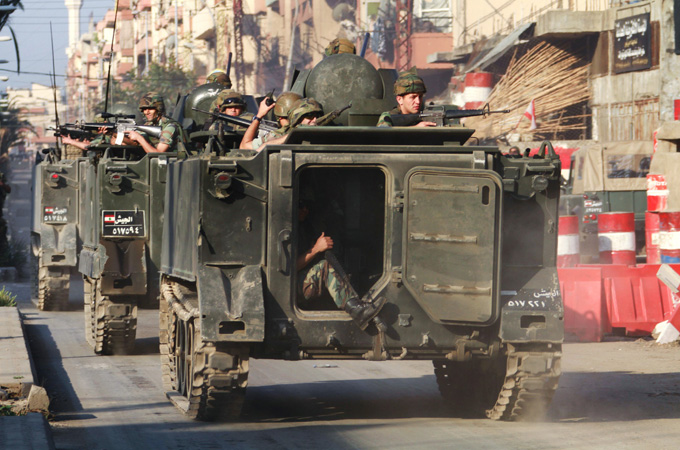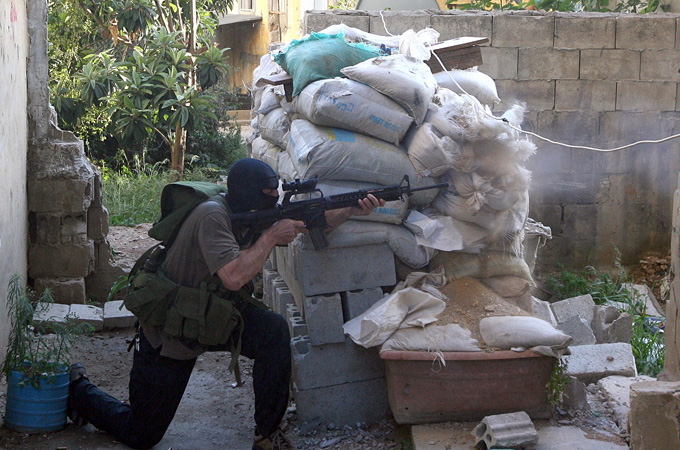Syrian war intensifies Lebanon’s divisions
Threat of ‘all-out war’ between Sunni and Alawite neighbours in north Tripoli as Syrian conflict spills over the border.

Jabal Mohsen, Lebanon – As violence escalates in Syria, residents of the tiny Alawite enclave of Jabal Mohsen in neighbouring Lebanon brace themselves for the next attack.
Tensions have long simmered between Alawites in Jabal Mohsen – a settlement atop a hill in the middle of Lebanon’s northern city of Tripoli – and the predominantly Sunni neighbourhood Bab al-Tabbaneh nestled at the bottom.
But this area has witnessed a surge in violence since the Syrian uprising began more than two years ago. The communities are still recovering from fighting that broke out on May 19, which killed at least 30 people and wounded more than 200 others on both sides.
“This is now the pattern – whenever anything happens in Syria, we feel the repercussions here,” said Abu Ali, a 34-year-old street commander in Jabal Mohsen.
Historically the two neighbourhoods have always been at loggerheads since the days of Lebanon’s civil war from 1975-1990, but violence has intensified with Syria’s ongoing conflict heating up nearby.
|
“The Syrian revolution enabled Tripoli, which was always a conservative town, to be created into a safe-house for [rebel] groups like Jabhat al-Nusra and the Free Syrian Army.“ – Ali Feddah, Alawite politician |
The Sunni neighbourhoods are ardent supporters of Syria’s armed opposition, and numerous reports have emerged of residents from the area fighting alongside rebels across the border.
The Alawites of Jabal Mohsen, meanwhile, are supporters of Syria’s government and President Bashar al-Assad, also a member of the offshoot sect of Shia Islam.
View from above
Looking out onto Bab al-Tabbaneh, it is not a pretty sight: buildings are riddled with bullet holes, and many facades blackened from the impact of mortar strikes. Flags belonging to the Free Syrian Army flutter in the wind – alongside black flags usually associated with al-Qaeda.
“The Syrian revolution enabled Tripoli, which was always a conservative town, to be created into a safe-house for [rebel] groups like Jabhat al-Nusra and the Free Syrian Army,” said Ali Feddah, a politician from the Arab Democratic Party (ADP), which is based in Jabal Mohsen.
“This made the situation on the ground worse, and opened up the battle fronts onto Jabal Mohsen … Now they are declaring jihad on us every other day.”
Pictures of Assad and his father, late Syrian president Hafez al-Assad, decorate the streets of Jabal Mohsen, amid buildings scarred from battles, old and new. A collection of Syrian flags are found on street corners and hanging from balconies. Lebanese army tanks are positioned on many street corners, and checkpoints have been installed at every entrance to the hill.
“We support the [Syrian] regime, yes, but it is also because the Lebanese state has done nothing over the years to help us,” said Abu Ali. “Our children today feel more Syrian than Lebanese.”
The Alawites in Lebanon number about 70,000, but have no political representation in the government.
There are no hospitals or universities in Jabal, the closest based in downtown Tripoli, which are only accessible by passing through the neighbourhoods they consider hostile.
 |
| Lebanese Army soldiers in Tripoli, northern Lebanon [Reuters] |
During clashes, entering and exiting Jabal is next to impossible as all entrances are blocked to prevent fighters from neighouring areas from infiltrating the area.
Life under siege
Surrounded by a population of 200,000 mostly Sunnis at the bottom of the hill, the predominantly Alawite residents of Jabal Mohsen describe their day-to-day lives as one under siege, many saying they have been unable to exit the area for months fearing attacks.
“I had to stop my work in Tripoli, and I haven’t been able to leave for about seven months,” said Fady, a Jabal resident, who gave only one name.
Sitting in a coffee shop smoking arguilleh with a large poster of Bashar al-Assad hanging above a fridge, Fady and his friends explained how they’ve adapted to this way of life.
“When there is a funeral down there, they fire shots at us, and when there is a wedding, they also fire shots at us,” he said. “We don’t let it stop us from enjoying life.”
His 16-year-old son, Firas, was prevented from taking his exams this year as a result of the clashes. “We’re used to this,” he told Al Jazeera with a shrug.
Abu Ali – a street commander since 2007 and in charge of about 100 men – said residents from his area have the most to lose whenever fighting erupts.
“When a battle starts, we die from hunger because we can’t leave. What interest do we have in poking the bear and starting a war?” he asked.
Weapons abound
Yet this does not prevent them from arming themselves and coordinating neighbourhood battalions to fight on the frontline. About 5,000 Alawite fighters are at the ready in Jabal today.
|
“You need to understand the level of poverty down there. There are many occasions where all we have to do is add credit to their phones and they give us information regarding movements of fighters and where to watch out.“ – Abu Ali, Alawite commander |
Abu Ali, who lost his 18-year-old brother in clashes last year, said while a large number of their weapons are old Russian arms, they have also bought guns from “the other side” down the hill.
“We offer them [Tabbaneh residents] $200 above the asking price of a gun, and they sell it to us,” Abu Ali said, adding his weapon of choice is a B-10 recoilless rifle.
“You need to understand the level of poverty down there. There are many occasions where all we have to do is add credit to their phones and they give us information regarding movements of fighters and where to watch out.”
He denied receiving training or weaponry from Hezbollah – the Shia Lebanese political-military movement – who have been accused of funneling arms to the area. Weapons have proliferated across Lebanon since the civil war, he said.
“We’ve learnt how to fend for ourselves, and we look after each other,” said Abu Ali.
The only thing preventing the Alawites of Jabal from being wiped out is the Lebanese Army, he said, which street commanders work with to secure the area.
According to one former army intelligence official in the area, working to secure Jabal Mohsen is much easier than working to secure Bab al-Tabbaneh, which is part of the reason why the clashes last so long sometimes.
“In Jabal Mohsen, you deal with one leader [Rifaat Eid] who has control over the population, so the army can come in quickly,” he told Al Jazeera on condition of anonymity, citing security concerns.
“In Bab al-Tabbaneh, every 100 metres there’s a different leader, and every month they change, so what takes a few hours in the Jabal will take at least three days in Tabbaneh.”
Human Rights Watch (HRW) has urged the government in Lebanon to disarm both sides to prevent violence from escalating.
“The conflict in Syria has the potential to fuel grievances between the communities and turn this into an all-out war,” said HRW’s Nadim Houry. “The government should act now to disarm abusers and address the heart of these grievances before it is too late.”
‘Calling us traitors’
To further complicate matters, about 10 Sunni families live in Jabal Mohsen and fight alongside the Alawites to defend themselves from attacks from their neighbours down the street.
 |
| A Sunni fighter takes position in Tripoli during fighting [AFP] |
Living on Jabal Mohsen’s frontline, these families have borne the brunt of the sectarian battles, with their bullet-marked buildings evidence of how they’ve paid the price for “living with the enemy”, as they’ve been accused of.
Fawzieh Merhej is a Sunni living in Jabal Mohsen for the last 60 years. She fiercely defends the Alawite residents of Jabal. “They give us Sunni families bread and water to our door before they even take care of themselves.”
Merhej, who has family members living in Tabbaneh, said she often gives them some of the aid she gets, “because I’m being looked after better than they are”.
An old woman with piercing eyes and a grandmother-like demeanor, she gesticulates angrily when describing the constant barrage of attacks she’s forced to endure.
“Now the residents of Tabbaneh are calling us traitors because we live here and refuse to move,” she said. “They’ve banned us from going to the souk [market] and have threatened us.”
For Abu Ali and his crew of fighters, there is no end in sight to the violence, regardless of what happens to the Assad regime in Syria.
“They will keep fighting us until Armageddon,” he said.